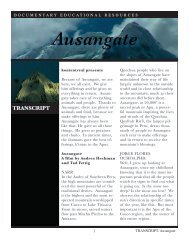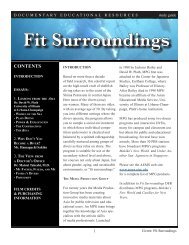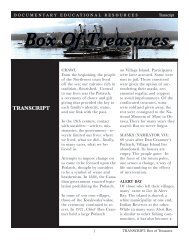Lessons from Gulam: Asian Music in Bradford - Documentary ...
Lessons from Gulam: Asian Music in Bradford - Documentary ...
Lessons from Gulam: Asian Music in Bradford - Documentary ...
Create successful ePaper yourself
Turn your PDF publications into a flip-book with our unique Google optimized e-Paper software.
D O C U M E N T A R Y E D U C A T I O N A L R E S O U R C E S study guide<br />
This left me free to enter <strong>in</strong>to the film without<br />
hav<strong>in</strong>g to worry about technical matters.<br />
Shot 49. John Daily arrives at <strong>Gulam</strong>’s house.<br />
8 June 1986.<br />
The narration says:<br />
‘The first day of the ‘Eid Festival at the end<br />
of Ramadan happened to be a Sunday. <strong>Gulam</strong><br />
<strong>in</strong>vited us all to his house for a special qawwali<br />
session.”<br />
This shot was completely set up. Not know<strong>in</strong>g<br />
the extent of gift-exchange for a <strong>Bradford</strong> ‘Eid<br />
I went shopp<strong>in</strong>g to buy various presents for<br />
<strong>Gulam</strong> and his family, as though it was Christmas<br />
(‘Eid was sometimes described as “our<br />
Christmas”). We arrived at <strong>Gulam</strong>’s house, I<br />
checked that <strong>Gulam</strong> was at home, then, when<br />
the crew were ready, “arrived” aga<strong>in</strong>. One<br />
giveaway is that <strong>Gulam</strong>’s front door is already<br />
open when I arrive, not usually the case at all.<br />
Shot 50. <strong>Gulam</strong> dedicates a song. 8 June 1986.<br />
Various relatives had arrived to visit <strong>Gulam</strong><br />
and his special qawwali session was held upstairs<br />
<strong>in</strong> the house next door, perhaps to avoid<br />
further disruption of his liv<strong>in</strong>g room, see<br />
Scene 4. This had recently been bought for<br />
GUIDE: <strong>Lessons</strong> <strong>from</strong> <strong>Gulam</strong> 26<br />
<strong>Gulam</strong>’s son Anvar to live <strong>in</strong> but was not yet<br />
fully furnished. A visit<strong>in</strong>g relative <strong>from</strong> Blackburn<br />
jo<strong>in</strong>ed <strong>in</strong> play<strong>in</strong>g tabla. Quite unexpectedly<br />
<strong>Gulam</strong> tells me that he has composed a<br />
song <strong>in</strong> honour of “you and your colleague”,<br />
which he then proceeds to s<strong>in</strong>g:<br />
What more can I give you than my heart,<br />
So that my watchful eye might rest on you?<br />
What more can I give you than my heart,<br />
So that death might not be your lot?<br />
A Pakistani friend has <strong>in</strong>formed me that <strong>Gulam</strong>’s<br />
song is typical of rural Mirasi musicians<br />
<strong>in</strong> the sub-cont<strong>in</strong>ent, sung <strong>in</strong> honour of their<br />
patrons. Textually it is typical of the genre<br />
called nazarana, sung to avert the evil eye. The<br />
accompaniment is rather hesitant as the band<br />
has never practised this particular song before.<br />
Shot 51. Norman below <strong>in</strong> the street. 8 June<br />
1986.<br />
Norman arrived half-way through the qawwali<br />
session, and appears <strong>in</strong> later footage. This shot<br />
is used to announce his arrival and re<strong>in</strong>force<br />
the impression that a gather<strong>in</strong>g of people is<br />
tak<strong>in</strong>g place. Over this shot these is a transition<br />
<strong>in</strong> the music <strong>from</strong> <strong>Gulam</strong>’s “praise” song<br />
to the f<strong>in</strong>al song <strong>in</strong> the film “Mast Qalandar”.<br />
Shots 52-54. <strong>Gulam</strong> s<strong>in</strong>gs “Mast Qalandar”. 8<br />
June 1986<br />
This song comes <strong>from</strong> the shr<strong>in</strong>e of the Sufi<br />
sa<strong>in</strong>t Lal Shahbaz Qalandar, <strong>in</strong> Sehwan-e<br />
Sharif, S<strong>in</strong>d. It is often used to end a qawwali<br />
session, and is therefore appropriate for end<strong>in</strong>g<br />
this film. It is very well known and has also<br />
been used <strong>in</strong> many Indian and Pakistani films.<br />
I requested <strong>Gulam</strong> to s<strong>in</strong>g it midway through<br />
the session. The text, <strong>in</strong> a mixture of Urdu<br />
and S<strong>in</strong>di, is:





